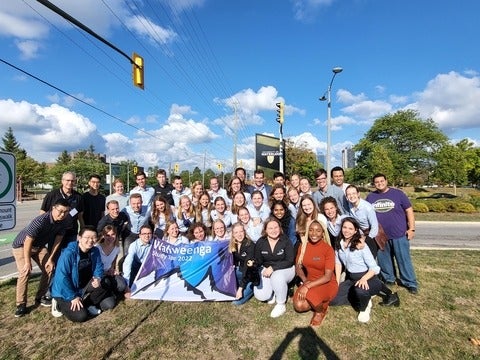The Centre for Bioengineering and Biotechnology is a catalyst for advancing bioengineering and biotechnology research and innovation through industry collaborations and partnerships.
More than 150 faculty members, from every faculty on campus, are actively engaged with the centre, working in collaboration to provide a resource of varying expertise.
Our mandate is to build healthy, active partnerships between centre researchers and corporate members through collaborative projects, mutual interest building, and networking events.
To learn more about partnerships, please email us.
Vision:
The Centre for Bioengineering & Biotechnology (CBB) enables interdisciplinary research across the university to address global challenges in human health and help translate those research results rapidly into practice, policy and impactful health outcomes. Achieving this vision will help the University of Waterloo to cement an international reputation at the interface of technology and human health.
Mission:
To achieve this vision, CBB's mission is to:
- Enable knowledge translation and support of the interdisciplinary research community through seminars, networking opportunities, and support of student groups
- Be a conduit to Waterloo's ecosystem of unique health related R&D and clinical resources
- Cultivate relationships with key stakeholders in technology, human, animal and environmental health and practice including industry, hospitals, community, and international bodies
- Provide Project Coordination/Management for large/inter-institutional projects
Join us:
To become a member of CBB, you can start by filling out a quick survey. We will then be in touch to discuss further.
News
Congratulations to the CBB Seed Funding recipients
This past fall 2022, the Centre for Bioengineering and Biotechnology invited researchers to submit their proposals to the annual Seed Funding competition. The mission of the CBB seed fund is to help drive scientific innovation, growth, and opportunity through the support of collaborative research across UW faculties. Congratulations to the award recipients for Round 6. Learn more about previous Seed Fund recipients.
Launch of Velocity Health
Recognizing the need for transformative solutions in an evolving healthcare landscape, Velocity is building a globally competitive platform for startups to commercialize health technology. This expansion provides world-class support to even more health startups in Canada.
Wahweenga Study Tour
In the Fall term of 2022, students from the Master’s programs, Biomedical Engineering and Technical Medicine, at the University of Twente in the Netherlands, visited the University of Waterloo. The Centre for Bioengineering and Biotechnology (CBB) was honoured to host this amazing group of students who also visited leading universities in Canada and the U.S.A., on a study tour that they called ‘Wahweenga’. Wahweenga translates to ‘perfection' in the native Ojibwe language, an Algonk language spoken by indigenous people of Canada and the central north of the U.S.A. This tour was focused on answering one question: ‘How do the technical (bio)medical sectors of Canada and the U.S.A. strive towards perfection?’





